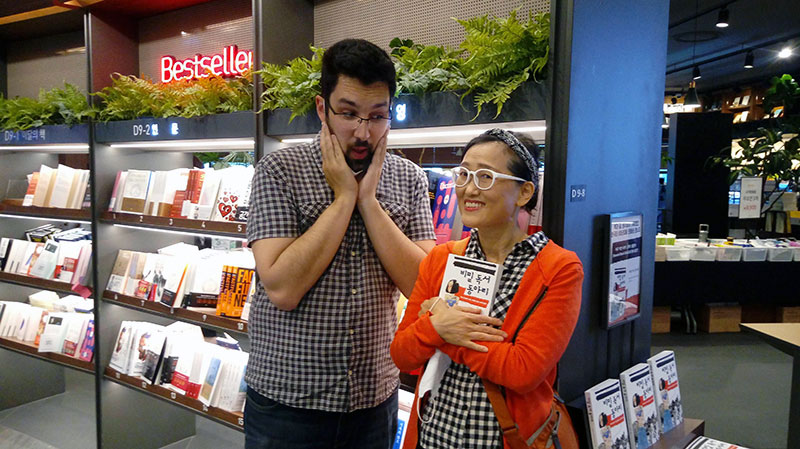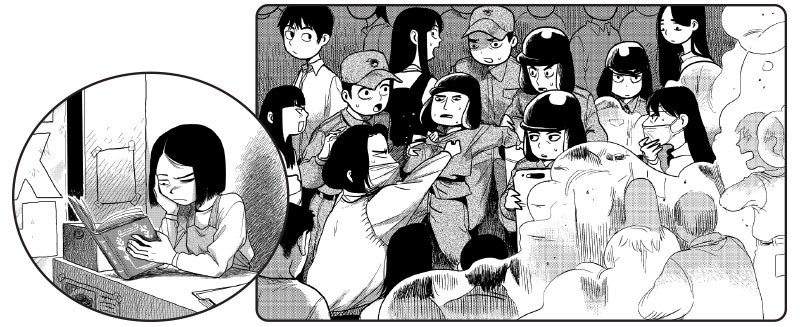'Banned Book Club' Authors Offer Advice as Teens Confront Censorship
Graphic novel authors Kim Hyun Sook and Ryan Estrada, who wrote about Kim's experience in a banned book club in South Korea in the 1980s, now find their book relevant to U.S. students.
 |
Kim Hyun Sook (left) with Ryan Estrada. They wrote Banned Book Club about Kim’s experiences in South Korea in the 1980s. |
Related article:Reading Rebels: As adults pull books from school library shelves across the country, kids create banned books clubs |
Ryan Estrada and Kim Hyun Sook were about five years into their marriage and living in Busan, South Korea, when Kim casually mentioned the time she was interrogated by the Agency for National Security Planning, formerly known as the Korean Central Intelligence Agency, for reading banned books.
“I was like, ‘Wait what?’” says Estrada, an author and graphic novelist from West Bloomfield, MI. “It wasn’t something she was keeping secret, it’s just that in Korea, this kind of story is so common that you wouldn’t think to mention it.”
In the 1980s during the dictatorship of Chun Doo-hwan, Kim was a young college student and literature lover who found herself in a banned book club, prompting her political awakening. The government banned hundreds of materials on topics from North Korea and colonialism to women’s rights and labor issues.
 |
Kim Hyun Sook |
“We met very secretly,” Kim says. “We had no name, because if we had a name for the book club, the police would find us.”
The club read The Scarlet Letter by Nathaniel Hawthorne, Counter-Revolutionary Violence by Noam Chomsky and Edward S. Herman, The Feminine Mystique by Betty Friedan, and more—using fake covers to hide the contents.
When Estrada tweeted about Kim’s experience, it caught the eye of the U.S. publisher Iron Circus Comics, which offered them a book deal. Kim and Estrada got to work on the graphic novel, Banned Book Club, interviewing Kim’s peers who shared experiences of being questioned, jailed, and even tortured when they were caught with banned books. The graphic novel, which was published in 2020 in English and Korean, is illustrated by Ko Hyung-Ju.
The book has been well-received in South Korea, but it has taken on a life of its own in the United States. When they were writing, Estrada and Kim didn’t imagine that censorship would become a hot topic in the United States. Though book challenges hadn’t yet swept U.S. school districts, at the time, there was talk at the federal and local level of government about banning The 1619 Project.
“After the book comes out, it’s like history suddenly repeats itself with these huge waves of people banning books,” Estrada says. “We had no idea it was going to be as timely as it was.”
When Estrada previously searched Twitter for “banned book club,” he found people talking about their book. Now, he reads tweets from people wanting to start banned book clubs in the United States in response to challenges about books primarily featuring stories about Black and LGBTQ characters. Librarians have reached out to Estrada and Kim asking them to speak
virtually about their book
and censorship, which they happily do—no matter the time difference.
In one meeting with kids in Texas, they discussed the book Magic Fish by Trung Le Nguyen, about a second-generation Vietnamese American teenager who is struggling to tell his parents about his sexual identity. The book made Texas state Rep. Matt Krause’s list of 850 books he proposes to ban.
“It’s not just damaging that people can’t read those books,” Estrada says, “but it’s hurting the people [who] are like the characters in those books. They feel like, ‘Am I so unacceptable that a book about someone like me is not safe to read?’”

Colleen Connolly is a Minneapolis-based freelance journalist who writes about children and education, among other subjects.
RELATED
The job outlook in 2030: Librarians will be in demand
The job outlook in 2030: Librarians will be in demand
ALREADY A SUBSCRIBER? LOG IN
We are currently offering this content for free. Sign up now to activate your personal profile, where you can save articles for future viewing





Add Comment :-
Be the first reader to comment.
Comment Policy:
Comment should not be empty !!!